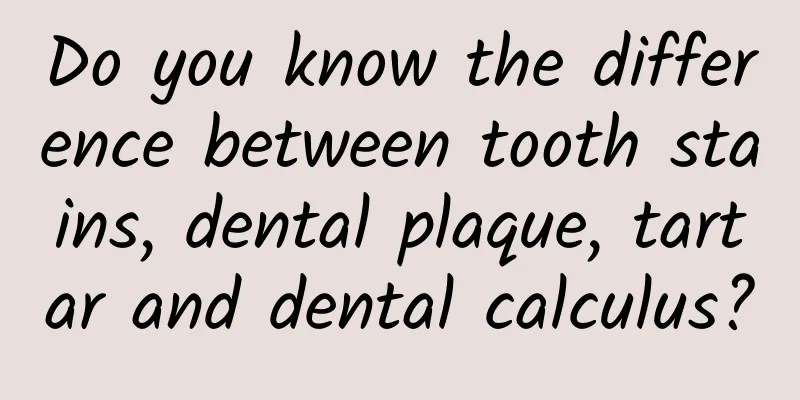Do you know the difference between tooth stains, dental plaque, tartar and dental calculus?

|
In life, we often hear Tooth stains? Tartar? Plaque? Calculus? Many people are wondering: Who are they? Although these substances are attached to the tooth surface But it is fundamentally different They have their own "characteristics" 01. Tooth stains Tooth stains are stains that adhere to the surface of the teeth. Divided into exogenous and intrinsic pigmentation Usually caused by daily habits ● Exogenous pigmentation Refers to the external staining of teeth. Generally speaking, it is caused by tea stains, smoke stains, mineral pigments in food with high pigment content in daily diet, etc., which makes the teeth appear gray or yellow. ● Intrinsic coloration During the period of tooth development, improper use of drugs such as tetracycline can affect the dentin and cause the teeth to show abnormal color, which is called tetracycline teeth . In addition, if there is too much fluoride in drinking water, it may also cause fluorosis , with white-pink and brown patches on the tooth surface. If the dental nerve is necrotic, it can also turn the teeth black after combining with bacterial decomposition products. 02. Tartar Tartar is also called soft plaque Refers to the yellowish-white soft stains that stick to the surface of the teeth Dental plaque is composed of microorganisms, desquamated epithelial cells, white blood cells, mucin in saliva, proteins, lipids and a small amount of food debris. Tartar likes to stick to the surface of teeth and under the gum line, mostly on the lingual side of the lower front teeth, and is yellowish white or grayish white. ** Tartar is relatively soft and easy to remove by brushing, but it can be deposited on the tooth surface again within a few hours after teeth cleaning. The bacteria in the tartar and their products irritate the soft tissues of the mouth. 03. Dental plaque Dental plaque is the precursor of dental calculus Dental plaque biofilm Dental plaque is the main cause of tooth decay and periodontal disease After eating, food residues remain in the mouth and form dental plaque within a few hours. When the amount of dental plaque is small, it is invisible to the naked eye and can only be seen through a dental plaque indicator. Dental plaque is like a "bacterial community" composed of different bacteria, which settles on the tooth surface, tooth gap or denture (denture, restoration) surface. Because the "community" is firmly rooted, it cannot be washed away by water or rinsed, and can only be removed by mechanical methods. 04. Dental calculus Dental calculus is formed by the mineralization of dental plaque. Yellowish white, darker due to tea drinking and smoking Based on the gingival margin, it can be divided into supragingival calculus and subgingival calculus. Dental calculus stimulates the gum tissue and causes inflammation, which is one of the causes of periodontal disease. Dental calculus is relatively hard and is tightly attached to the teeth. It cannot be removed by brushing teeth normally, and ultrasonic cleaning is required at a regular dental medical institution. Dental calculus itself easily absorbs more bacterial toxins, irritating the periodontal soft tissues, causing congestion and edema of the gums, and causing bleeding when brushing teeth. As time goes by, more and more dental calculus accumulates, causing the gaps between teeth to become wider, halitosis to worsen, gums to shrink, teeth to become loose and shifted, and teeth to fall out , so timely treatment is needed. To thoroughly remove tartar, you need to wash your teeth regularly! Dental plaque and tartar are the main culprits of periodontal inflammation. The harm of tartar to periodontal tissues is mainly because it provides a good place for plaque to adhere and bacteria to breed. Therefore, in the prevention and treatment of periodontal tissue diseases, it is very important to completely remove tartar. Therefore, it is recommended that you wash your teeth regularly . Teeth cleaning is an important means of preventing periodontal diseases. It is generally recommended to clean teeth every six months. Regular teeth cleaning has many benefits, which can prevent problems such as bleeding gums, gingivitis, loose teeth, and prevent oral diseases such as caries. Note: The pictures in this article are from the website, and some of the text is excerpted from the Internet. The copyright belongs to the original author. If there is any infringement, please contact us and we will delete it. |
<<: Mycoplasma pneumoniae infection early knowledge
>>: comScore: US mobile phone user data for May 2012
Recommend
What to do if your belly is hard in late pregnancy
Pregnancy is the time when people pay the most at...
Overeating watermelon can easily lead to amenorrhea in women with cold body
Summer is the most enjoyable season to eat waterm...
What to do if a pregnant woman feels uncomfortable
Pregnant women often experience various discomfor...
Causes of early black menstruation
For women, once gynecological diseases cause infe...
Stretch marks under belly button on the left
Stretch marks are a very common condition for exp...
What is the cause of inverted nipples?
Inverted nipples are a very common phenomenon. In...
What causes vertigo in women?
If many female friends always feel that they have...
How to rule out pregnancy after delayed menstruation
Generally speaking, many women have experienced d...
Is it impossible to defeat "overwork obesity"? Not necessarily, learn these seven tricks or you may be able to "beat" it →
Many people have discovered that obesity is a wor...
What can't you eat when you have a bad stomach and drink pumpkin porridge? Tips on how to avoid eating millet pumpkin porridge
Many people believe that drinking porridge in the...
What starch is used for the pot-wrapped pork? Tips for the pot-wrapped pork
Sweet and sour pork is a popular delicacy. There ...
What should I do if I lose a lot of hair after giving birth?
Some women often experience symptoms of yellowing...
Where is the mole of the husband?
Moles are a very common physiological manifestati...
Girls suddenly become sweaty
People who sweat all the time always feel very un...
When does menstruation come after weaning? Introducing professional physiological knowledge to you
The question of when a woman will have her period...









